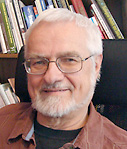Ants … agriculture … coffee … complexity … parasites … predators. John Vandermeer’s decade-long study of the ecological intricacies of a coffee plantation in Mexico is as wide-ranging as it is thorough.
Underlying it all is his commitment to aligning his passion — “figuring out how nature works” — with his moral compass. These days, that compass guides him in efforts to protect the environment and support traditional, sustainable, small-scale farming practices.

Vandermeer, who is the Asa Gray Distinguished University Professor of Ecology and Evolutionary Biology, will discuss his work and his belief that scientists should merge research interests with personal convictions in his Distinguished University Professorship lecture at 4 p.m. April 11 in the Rackham Amphitheatre. A reception will follow the lecture, which is free and open to the public.
Vandermeer’s approach to research is reflected in his decision to name his professorship after Asa Gray. Gray, who lived in the 1800s, widely is regarded as the most important American botanist of the 19th century, but that’s not the reason behind Vandermeer’s choice.
“Everybody knows of Asa Gray as a famous botanist, but he was a lot more, because of his relationship with Charles Darwin, which gets us to the fact that Charles Darwin was something different than many people think,” says Vandermeer, who also is an Arthur F. Thurnau Professor of Ecology and Evolutionary Biology. As detailed by Darwin biographers Adrian Desmond and James Moore in “Darwin’s Sacred Cause,” the famous naturalist’s quest to gather evidence of evolution was motivated not just by an interest in plants and animals, but by a desire to fight racism and the institution of slavery by showing that all humans belong to the same species and have a shared ancestry. Gray aided Darwin’s effort by feeding him information about the activities of Darwin’s antagonist Louis Agassiz.
Inspired by the examples of Darwin and Gray, Vandermeer uses his science to challenge another institution: industrial agriculture.
“My passion is ecology; my moral compass is articulated with one of the most salient political problems we have in the world today: the transfer of agriculture from its current industrial form to a more sustainable, agro-ecological form. That’s why I do what I do,” he says.
On the organic coffee farm in Mexico, Vandermeer and colleague Ivette Perfecto have uncovered a complex web of interactions among ants, coffee pests, and the parasites, predators and diseases that affect the pests. This web buffers the farm against extreme outbreaks of pests and diseases, rendering pesticides and fungicides unnecessary. Interestingly, the picture that’s emerging from their work closely resembles the long-held view that traditional farmers in the area have of a harmonious balance among all the elements of the local agro-ecosystem.
In other work, Vandermeer and Perfecto showed that, contrary to conventional wisdom in conservation circles, the peasant farming practices encouraged by grassroots movements such as Via Campesina actually support rather than undermine biodiversity. These and other findings, along with that moral compass, have motivated Vandermeer and Perfecto to become involved with the international organization.
“We now know that small-scale agriculture is both more efficient at producing food and more environmentally sustainable than the industrial system,” Vandermeer says. “The fact that modern ecology recapitulates many of the attitudes and practices of small-holder farmers just reinforces the growing movement to transform agriculture to a more sustainable form so as to protect the earth and feed the hungry. As Via Campesina says, small-scale farmers can feed the world and cool the planet.”

